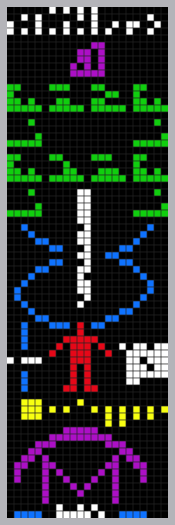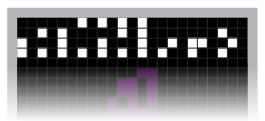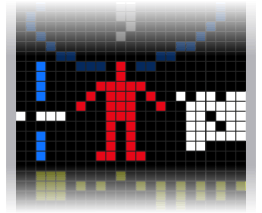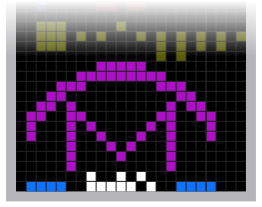Arecibo message

The Arecibo message is a 1974 interstellar radio message carrying basic information about humanity and Earth sent to globular star cluster M13 in the hope that extraterrestrial intelligence might receive and decipher it. The message was broadcast into space a single time via frequency modulated radio waves at a ceremony to mark the remodeling of the Arecibo radio telescope in Puerto Rico on 16 November 1974.[1][2] The message was aimed at the current location of M13 some 25,000 light years away because M13 was a large and close collection of stars that was available in the sky at the time and place of the ceremony.[3] The message consisted of 1,679 binary digits, approximately 210 bytes, transmitted at a frequency of 2,380 MHz and modulated by shifting the frequency by 10 Hz, with a power of 1,000 kW. The "ones" and "zeros" were transmitted by frequency shifting at the rate of 10 bits per second. The total broadcast was less than three minutes.[1][4]
The cardinality of 1,679 was chosen because it is a semiprime (the product of two prime numbers), to be arranged rectangularly as 73 rows by 23 columns. The alternative arrangement, 23 rows by 73 columns, produces jumbled nonsense (as do all other X/Y formats). The message forms the image shown on the right, or its inverse, when translated into graphics, characters and spaces.[5]
Dr. Frank Drake, then at Cornell University and creator of the Drake equation, wrote the message with help from Carl Sagan, among others.[1] The message consists of seven parts that encode the following (from the top down):[5]
- The numbers one (1) to ten (10) (white)
- The atomic numbers of the elements hydrogen, carbon, nitrogen, oxygen, and phosphorus, which make up deoxyribonucleic acid (DNA) (purple)
- The formulas for the sugars and bases in the nucleotides of DNA (green)
- The number of nucleotides in DNA, and a graphic of the double helix structure of DNA (white & blue)
- A graphic figure of a human, the dimension (physical height) of an average man, and the human population of Earth (red, blue/white, & white respectively)
- A graphic of the Solar System indicating which of the planets the message is coming from (yellow)
- A graphic of the Arecibo radio telescope and the dimension (the physical diameter) of the transmitting antenna dish (purple, white, & blue)
Since it will take nearly 25,000 years for the message to reach its intended destination (and an additional 25,000 years for any reply), the Arecibo message is viewed as a demonstration of human technological achievement, versus a real attempt to enter into a conversation with extraterrestrials. In fact, the core of M13, to which the message was aimed, will no longer be in that location when the message arrives.[1] However, as the proper motion of M13 is small, the message will still arrive near the center of the cluster.[6] According to the Cornell News press release of November 12, 1999, the real purpose of the message was not to make contact but to demonstrate the capabilities of newly installed equipment.[1]
Explanation
Numbers

1 2 3 4 5 6 7 8 9 10 ---------------------- 0 0 0 1 1 1 1 00 00 00 0 1 1 0 0 1 1 00 00 10 1 0 1 0 1 0 1 01 11 01 X X X X X X X X X X <-least-significant-digit marker
The numbers from 1 to 10 appear in binary format (the bottom row marks the beginning of each number).
Even assuming that recipients would recognize binary, the encoding of the numbers may not be immediately obvious because of the way they have been written. To read the first seven digits, ignore the bottom row, and read them as three binary digits from top to bottom, with the top digit being the most significant. The readings for 8, 9 and 10 are a little different, as they have been given an additional column next to the first (to the right in the image). This is probably intended to show that numbers too large to fit in a column can be written in several contiguous ones, where the contiguous columns do not have the least-significant-digit marker.
DNA elements

H C N O P 1 6 7 8 15 ---------- 0 0 0 1 1 0 1 1 0 1 0 1 1 0 1 1 0 1 0 1 X X X X X
The numbers 1, 6, 7, 8 and 15 appear. These are the atomic numbers of hydrogen (H), carbon (C), nitrogen (N), oxygen (O), and phosphorus (P), the components of DNA.
The numbers 8 and 15 are written in a logical extension of binary encoding, rather than with the contiguous-columns method shown in the message's number figures at the top.
Nucleotides
 |
|||||
| Deoxyribose (C5H7O) |
Adenine (C5H4N5) |
Thymine (C5H5N2O2) |
Deoxyribose (C5H7O) |
||
| Phosphate (PO4) |
Phosphate (PO4) |
||||
| Deoxyribose (C5H7O) |
Cytosine (C4H4N3O) |
Guanine (C5H4N5O) |
Deoxyribose (C5H7O) |
||
| Phosphate (PO4) |
Phosphate (PO4) |
||||
The nucleotides are described as sequences of the five atoms that appear on the preceding line. Each sequence represents the molecular formula of the nucleotide as incorporated into DNA (as opposed to the free form of the nucleotide).
For example, deoxyribose (C5H7O in DNA, C5H10O4 when free), the nucleotide in the top left in the image, is read as:
11000 10000 11010 XXXXX ----- 75010
i.e., 7 atoms of hydrogen, 5 atoms of carbon, 0 atoms of nitrogen, 1 atom of oxygen, and 0 atoms of phosphorus.
Double helix

11 11 11 11 11 01 11 11 01 11 01 11 10 11 11 01 X
1111111111110111 1111101101011110 (binary) = 4,294,441,822 (decimal)
DNA double helix; the vertical bar represents the number of nucleotides. The value depicted is around 4.3 billion, which was believed to be the case in 1974 when the message was transmitted. It is currently thought that there are about 3.2 billion base pairs in the human genome.
Humanity

X011011
111111
X0111 110111
111011
111111
110000
1110 (binary) = 14 (decimal)
000011 111111 110111 111011 111111 110110 (binary) = 4,292,853,750 (decimal)
The element in the center represents a human. The element on the left (in the image) indicates the average height of an adult male: 1.764 m (5 ft 9.45 in). This corresponds to the horizontally written binary 14 multiplied by the wavelength of the message (126 mm). The element on the right depicts the size of human population in 1974, around 4.3 billion. In this case, the number is oriented in the data horizontally rather than vertically. The least-significant-digit marker is in the upper left in the image, with bits going to the right and more significant digits below.
Planets

Earth Sun Mercury Venus Mars Jupiter Saturn Uranus Neptune Pluto
The solar system, showing the Sun and the planets in the order of their position from the Sun: Mercury, Venus, Earth, Mars, Jupiter, Saturn, Uranus, Neptune, and Pluto. (Pluto has since been reclassified as a dwarf planet by the International Astronomical Union, but it was still considered a planet at the time the message was transmitted.)
The Earth is the third planet from the Sun; its graphic is shifted up to identify it as the planet from which the signal was sent. Additionally, the human figure is shown just above the Earth graphic.
In addition to showing position, the graphic provides a general, not-to-scale size reference of each planet and the Sun.
Telescope

bottom two rows:
100101
<--- 111110X --->
100101 111110 (binary) = 2,430 (decimal)
The last part represents the Arecibo radio telescope with its diameter: 2,430 multiplied by the wavelength gives 306.18 m (1,004 ft 6 in). In this case, the number is oriented horizontally, with the least-significant-digit marker to the lower right in the image. The part of the image that looks like a letter "M" is there to demonstrate to the reader of the message that the curved line is a paraboloid mirror.

Message as binary string
00000010101010000000000 00101000001010000000100 10001000100010010110010 10101010101010100100100 00000000000000000000000 00000000000011000000000 00000000001101000000000 00000000001101000000000 00000000010101000000000 00000000011111000000000 00000000000000000000000 11000011100011000011000 10000000000000110010000 11010001100011000011010 11111011111011111011111 00000000000000000000000 00010000000000000000010 00000000000000000000000 00001000000000000000001 11111000000000000011111 00000000000000000000000 11000011000011100011000 10000000100000000010000 11010000110001110011010 11111011111011111011111 00000000000000000000000 00010000001100000000010 00000000001100000000000 00001000001100000000001 11111000001100000011111 00000000001100000000000 00100000000100000000100 00010000001100000001000 00001100001100000010000 00000011000100001100000 00000000001100110000000 00000011000100001100000 00001100001100000010000 00010000001000000001000 00100000001100000000100 01000000001100000000100 01000000000100000001000 00100000001000000010000 00010000000000001100000 00001100000000110000000 00100011101011000000000 00100000001000000000000 00100000111110000000000 00100001011101001011011 00000010011100100111111 10111000011100000110111 00000000010100000111011 00100000010100000111111 00100000010100000110000 00100000110110000000000 00000000000000000000000 00111000001000000000000 00111010100010101010101 00111000000000101010100 00000000000000101000000 00000000111110000000000 00000011111111100000000 00001110000000111000000 00011000000000001100000 00110100000000010110000 01100110000000110011000 01000101000001010001000 01000100100010010001000 00000100010100010000000 00000100001000010000000 00000100000000010000000 00000001001010000000000 01111001111101001111000
See also
- Active SETI—METI (Messaging to Extra-Terrestrial Intelligence)
- A Message from Earth
- Communication with Extraterrestrial Intelligence (CETI)
- Cosmic Call
- Pioneer plaque
- Voyager Golden Record
- Wow! signal (mentions reply in 2012 using Arecibo)
References
- 1 2 3 4 5 "Cornell News: It's the 25th anniversary of Earth's first (and only) attempt to phone E.T.". Nov 12, 1999. Archived from the original on 2008-08-02. Retrieved 2008-03-29.
- ↑ Johnson, Steven (28 June 2017). "Greetings, E.T. (Please Don’t Murder Us.)". New York Times. Retrieved 28 June 2017.
- ↑ Larry Klaes (2005-11-30). "Making Contact". Ithaca Times. Archived from the original on 2009-01-07. Retrieved 2007-07-27.
- ↑ Jay M. Pasachoff. "Chapter 20: Life in the Universe". Williams.edu. Retrieved 2007-05-05.
- 1 2 Cassiday, George. "The Arecibo Message". Retrieved 12 Oct 2013.
- ↑ Dave Deamer (December 4, 2009). "In regard to the email from". Science 2.0.
External links
| Wikimedia Commons has media related to Arecibo message. |
- SETI homepage on the message
- Interstellar Radio Messages
- The Arecibo Message explained
- Self-Decoding Messages